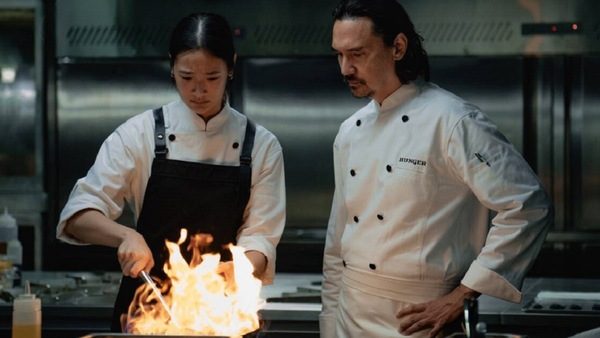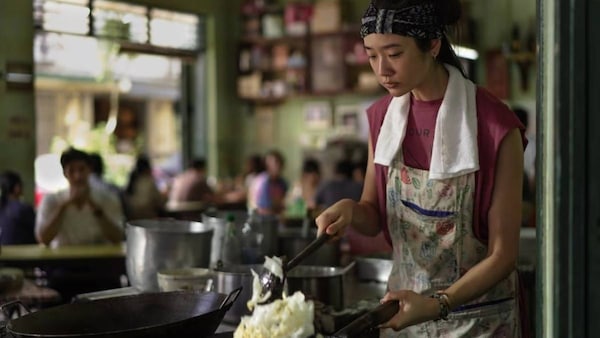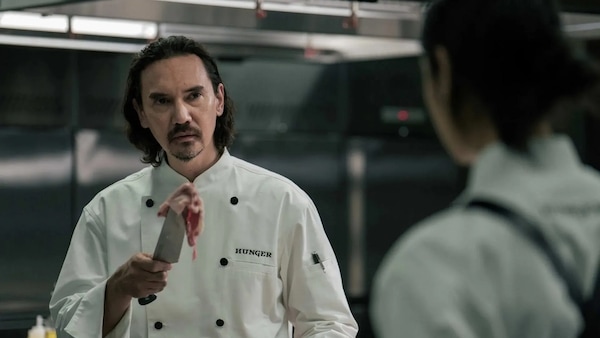Hunger: Familiar Ingredients Make Up A Promising Dish In Need Of Seasoning
Netflix's Thai film, Hunger, follows in the footsteps of The Menu, Parasite and even Whiplash. Harsh Pareek does a taste test to see if it delivers more than the sum of its parts.

Last Updated: 03.40 PM, Apr 26, 2023
This column was originally published as part of our newsletter The Daily Show on April 26, 2023. Subscribe here. (We're awesome about not spamming your inbox!)
***
IF there were a recipe for Netflix's new dining/kitchen drama-thriller Hunger, one would assume it would go something like this: Put a wok on high flame, add generous portions of the following — social commentary from the jars labelled Parasite and The Menu, mentor-pupil dynamics (mostly abuse, i.e) from the can marked Whiplash, and an ample scoop from the anime (didn't see this coming, did you?) tin case marked, Food Wars!: Shokugeki no Soma to top it all off. It is important to note though that we are not looking for subtle flavours here, but aiming to serve the dish in comfort food-esque chunky bits that could be consumed without much deliberation. Lastly, the dish should be served in the presently fashionable cutlery of eat-the-rich and/or the-messy-world-of-fine-dining.
Now, owing to the above-mentioned indigents and zeitgeisty hunger(!) for the overarching themes, the film comes out with a peculiar taste. While it's mostly a by-the-numbers affair put together by a streaming service, it is also surprisingly watchable; but at the same time, despite so much that it draws upon with abandon, by the end one is not quite sure what the film wishes to say apart from the crudely obvious.
Directed by Sittisiri Mongkolsiri, Hunger follows Aoy (Chutimon 'Aokbab' Chuengcharoensukying), a woman in her twenties, who runs her family's noodles restaurant in the old quarter of Bangkok. Her dull, everyday existence takes a turn when she receives an invitation to join 'Hunger', a luxury Chef's table (all men) team led by the infamous Chef Paul (Nopachai Chaiyanam), the ingenious yet nasty “high priest of fine dining” who serves only the rich and powerful. But what begins as an opportunity for Ayo to break out, escalates into a battle of ideologies and egos as she clashes with Paul in her quest to be “special”.

While the film is guilty of being thoroughly predictable and has little to add of its own to the larger conversation around the class and economic divide, it still manages to be engaging, thanks in no small part to some nuanced performances and well crafted pacing. While Aokbab juggles her character's struggles, ambitions, tenderness, and fight effortlessly, Chaiyanam brings a quiet menace to Paul's character that never lets off. And for an almost two-and-a-half hour affair, one would be hard-pressed to pick a scene that overstays its welcome or feels too out of place (in fact, one feels like a scene or two might be missing towards the end).
Yet another element that works in its favour is its setting: Thailand. From the high rises of Bangkok to remote fishing islands, the film doesn't restrict itself to indoor sets and is all the more rich for it. Moreover, it is always refreshing to see an Asian project exploring broader contemporary themes find a global platform.
All that said, it's difficult not to see Hunger as a lesser imitation of its many recent inspirations. For the most part, the film feels obliged to spell out every little social critique it engages with, never trusting the audience to join the dots. Blunt, well-worn dialogue after dialogue seems to be the only approach it knows to get the message across.
As for the two lead characters, the further the film moves along, the more muddled their motivations get; so much so that by the end they seem a bit robbed of their personalities. While this at times can work in favour of a story, here Ayo seems to be sleepwalking through the latter half of the film just to serve the script, with little clue as to what is driving her (not to mention, with the predicability of what lies ahead). Chef Paul, on the other hand, who exudes an almost supernatural aura from the get go, bringing out the primal, animalistic instincts in his patrons, and while being established as a somewhat layered character with a serviceable backstory earlier, is served with an almost cartoonishly absurd and abrupt conclusion.

Talking of conclusions, for a film that mostly tries to stay grounded, the grand finale/showdown between Ayo and Chef Paul is just wild — whether in a good way or not will depend on where you're coming from. It wouldn't be an exaggeration (at all) to say that it feels like suddenly stepping into a live adaptation of an over-the-top anime, complete with the drama, the music, the costumes, the acting, the slow motion and everything. If that's up your alley, rejoice; if not, it's another stumble towards the end.
It's not far-fetched to think that the sheer absurdity might be the filmmaker showcasing what the notion of success means in our times and the lengths one has to go for it, but it just doesn't quite sit well on the foundations the film is built upon. However, like with most of the film, if nothing else, it's well shot and entertaining.
While Hunger has much to say, be it in form Chef Paul's nihilistic world-view, or Ayo and her friends' disillusionment with a society that caters only to the rich and their nepo babies, or how often social appeal outweighs skills or artistic talent, in the end it lacks the depth to resonate in a novel or meaningful way. And it's a shame, for the film has a lot going for itself outside the script. All it needs is a little salt.
